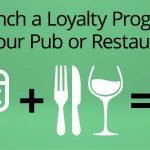Encourage Your Pub Customers To “Go Dutch”
A simple, quick and effective way to re-capture straying customers which will have a significant effect on seeing revenues grow and slowing pub closures?
Is it time for Licencees to actively encourage a cultural change and make it easier for their customers to “Go Dutch”? Why not try it in your pub; be the first!!!
I hear it more and more often from my mates and others; “Buying a round of drinks in the pub is becoming prohibitive, but I do not want to be seen as a tight-ass or kill-joy, so I avoid the pub at certain times when I know I will get inveigled into a round”.
We are one of the few countries (if not the only one remaining) where “round buying” is in our culture, but my belief is that by discouraging the habit, it could be one of the simplest and quickest ways pubs can recapture customers (who are now buying from supermarkets and staying at home more often).
Make it easy for them to say “I’m going Dutch”, take away any stigma they might suffer, make it the norm for your pub, sell the idea “We encourage buying your own”.
I observe very closely when I go to my local pub and even more when I play a four ball at golf, I always get to the bar first (its in my nature and upbringing having been in free trade sales at one time, with a very substantial expense account for doing just that).
Recently, (true story) I had a cup of tea for myself, then proceeded to buy the guys their want which included two pints of Guinness, and one pint of Carlsberg, total £12.70 (my tea was £1.15). The next round was one pint BB (me) two halves of Guinness, one half Carlsberg total £9.40. There wasn’t a third or fourth round because the “I’m driving” defence was used. Now you do not need to be a mathematical or anthropological genius to work out that two guys were happy, one was just about OK and one (me) was seriously bemused! I have no wish to portray myself as a rich dude who can afford the £11.70 rather than the actual cost of one tea and one pint, total £3.60, but I do say that others perhaps on a tighter budget than myself will baulk at even coming into the bar to run the risk of being the £12.70 man (happening more and more).
So let’s start an industry campaign with licencees promoting the behavior of ‘Going Dutch’ with t-shirts, banners, drip mats, badges… perhaps with the tag: “I’m going Dutch at The Dog and Duck”, then watch customers flood back!! By the way this is a “man thing”, the girls invariably have it sorted when they go out, they either have a kitty (Dutch Treat) or stay buying their own, or break into “twos”, lets get the fellas doing the same!
And for the intellectuals amongst you…
“Going Dutch” is a term that indicates that each person participating in a group activity pays for himself, rather than any person paying for anyone else, particularly in a restaurant bill. It is also called Dutch date, Dutch treat (the oldest form) and “doing Dutch”.
There are two possible senses; each person paying his own expenses, or the entire bill being split (divided evenly) between all participants. In strict usage, “Going Dutch” refers to the former, paying one’s own expenses, and the latter is referred to as “splitting the bill”, but in casual usage these may both be referred to as “going Dutch”. Splitting the bill is generally easier to compute, as it does not require checking what each individual ordered, but has the downside that people who ordered more expensive items are subsidised by others.
Etymology
One suggestion is that the phrase “going Dutch” originates from the concept of a Dutch door. Previously on farmhouses this consisted of two equal parts (Sullivan 2010). Another school of thought is that it may be related to Dutch etiquette. In the Netherlands, it was not unusual to pay separately when going out as a group. The Oxford English Dictionary connects “go Dutch” with “Dutch treat” and other phrases, many of which have “an opprobrious or derisive application, largely due to the rivalry and enmity between the English and Dutch in the 17th century” – the period of the Anglo-Dutch Wars. Another example is “Dutch courage”.






